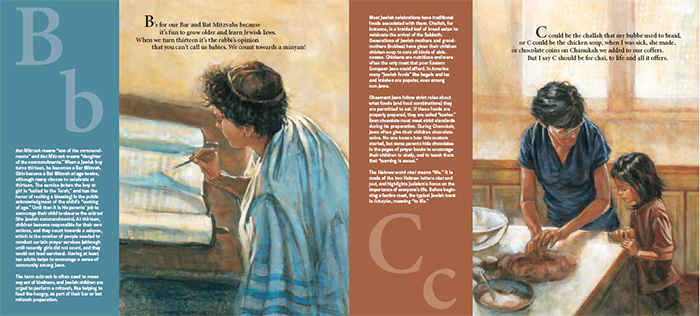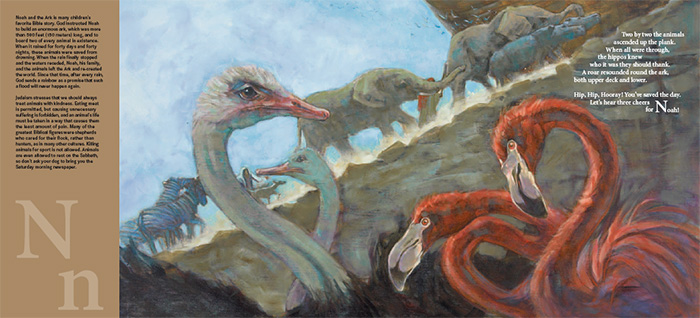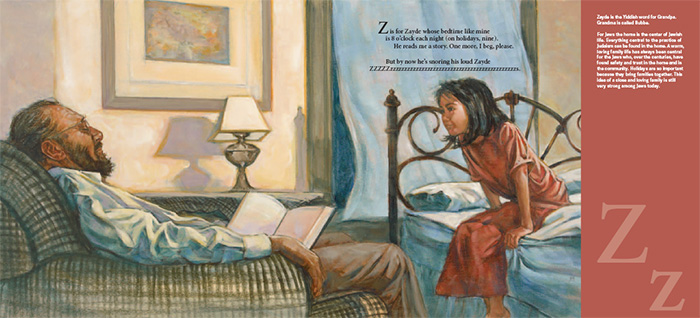A IS FOR ABRAHAM

B’s for our Bar and Bat Mitzvahs because it’s fun to grow older and learn Jewish laws. When we turn thirteen it’s the rabbi’s opinion that you can’t call us babies. We count towards a minyan!
Bar Mitzvah means “son of the commandments” and Bat Mitzvah means daughter of the commandments.” When a Jewish boy turns thirteen, he becomes a Bar Mitzvah. Girls become a Bat Mitzvah at age twelve, although many choose to celebrate at thirteen. The service (when the boy or girl is “called to the Torah,” and has the honor of reciting a blessing) is the public acknowledgment of the child’s “coming of age.” Until then it is his parents’ job to encourage their child to observe the mitzvot (the Jewish commandments). At thirteen, children become responsible for their own actions, and they count towards a minyan, which is the number of people needed to conduct certain prayer services (although until recently girls did not count, and they could not lead services). Having at least ten adults helps to encourage a sense of community among Jews.
The term mitzvah is often used to mean any act of kindness, and Jewish children are urged to perform a mitzvah, like helping to feed the hungry, as part of their bar or bat mitzvah preparation.
C could be the challah that my bubbe used to braid, or C could be the chicken soup, when I was sick, she made, or chocolate coins on Chanukah we added to our coffers. But I say C should be for chai, to life and all it offers.
Most Jewish celebrations have traditional foods associated with them. Challah, or instance, is a braided loaf of bread eaten to celebrate the arrival of the Sabbath. Generations of Jewish mothers and grandmothers (bubbes) have given their children chicken soup to cure all kinds of sicknesses. Chickens are nutritious and were often the only meat that poor Eastern European Jews could afford. In America many “Jewish foods” like bagels and lox and knishes are popular, even among non-Jews.
Observant Jews follow strict rules about what foods (and food combinations) they are permitted to eat. If these foods are properly prepared, they are called “kosher.” Even chocolate must meet strict standards during its preparation. During Chanukah, Jews often give their children chocolate coins. No one knows how this custom started, but some parents hide chocolates in the pages of prayer books to encourage their children to study, and to teach them that “learning is sweet.”
The Hebrew word chai means “life.” It is made of the two Hebrew letters chet and yod, and highlights Judaism’s focus on the importance of everyone’s life. Before beginning a festive meal, the typical Jewish toast is l’chayim, meaning “to life.”

Two by two the animals
ascended up the plank.
When all were through,
the hippos knew
who it was they should thank.
A roar resounded round the ark,
both upper deck and lower.
Hip, Hip, Hooray! You’ve saved the day.
Let’s hear three cheers
for Noah!
Noah and the Ark is many children’s favorite Bible story. God instructed Noah to build an enormous ark, which was more than 500 feet (150 meters) long, and to board two of every animal in existence. When it rained for forty days and forty nights, these animals were saved from drowning. When the rain finally stopped and the waters receded, Noah, his family, and the animals left the Ark and re-created the world. Since that time, after every rain, God sends a rainbow as a promise that such a flood will never happen again.
Judaism stresses that we should always treat animals with kindness. Eating meat is permitted, but causing unnecessary suffering is forbidden, and an animal’s life must be taken in a way that causes them the least amount of pain. Many of the greatest Biblical figures were shepherds who cared for their flock, rather than hunters, as in many other cultures. Killing animals for sport is not allowed. Animals are even allowed to rest on the Sabbath, so don’t ask your dog to bring you the Saturday morning newspaper.

Z is for Zayde whose bedtime like mine
is 8 o’clock each night (on holidays, nine).
He reads me a story. One more, I beg, please.
But by now he’s snoring his loud Zayde
ZZZZZzzzzzzzzzzzzzzzzzzzzzzzzzzzs.
Zayde is the Yiddish word for Grandpa. Grandma is called Bubbe.
For Jews the home is the center of Jewish life. Everything central to the practice of Judaism can be found in the home. A warm, loving family life has always been central for the Jews who, over the centuries, have found safety and trust in the home and in the community. Holidays are so important because they bring families together. This idea of a close and loving family is still very strong among Jews today.